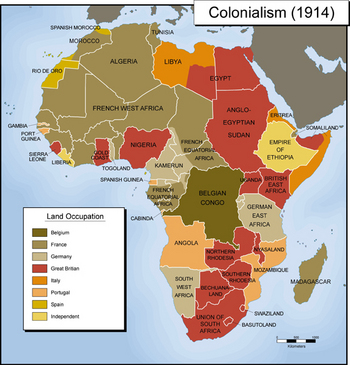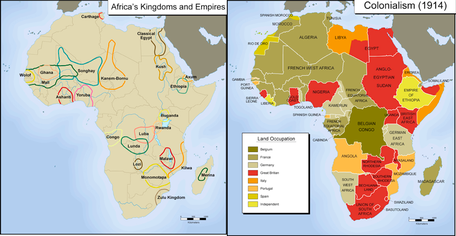The Berlin Conference ignited a flurry of political and social changes in Africa.
Changing Borders
|
"Rise and Fall of the British Empire" Professor Patrick N. Allitt, Ph.D., University of California, Berkeley Emory University "The German chancellor, Bismarck, arranged a colonial conference in Berlin in 1884-5 in the hope of preventing the European nations from falling out with one another as they colonized greater parts of Africa. France annexed much of Northern Africa, across which the French foreign legion ranged for the next half-century. Germany seized the lands that are now Namibia and Tanzania. The king of Belgium took the Congo as a personal fiefdom, while Portugal held on to its old colonies of Angola and Mozambique."
The arbitrary rearranging of borders during the Berlin Conference divided tribes and grouped them with their enemies, which triggered culture loss and led to much tension and fragmentation. |
Indirect Rule — Increased Tension
"New Realities"
Professor Kenneth P. Vickery, Ph.D., Yale University
North Carolina State University
Professor Kenneth P. Vickery, Ph.D., Yale University
North Carolina State University
|
Part 1
"Few Europeans were actually involved in the running of Europe's empires in Africa. For reasons of low numbers alone, then, they needed the African chiefs. They needed them to maintain this order. They needed them to settle disputes, particularly minor disputes, and, of course, to collect the taxes. The African chief, then, found himself in a delicate "man-in-the-middle" position under colonial rule. His followers expected him to, essentially, voice their own concerns to the authority structure higher up."
|
Part 2
"But, of course, the rulers had their own expectations. Now, if you do the first job too well, you run the risk of being replaced by someone whom the authorities find more cooperative. If you do the second job too well, and become an all-too-efficient or valuable assistance in the carrying out of these colonial mandates, you run another kind of risk, and that is a thorough alienation from the very people whom you are the ruler over, and you risk being labeled a 'sell-out,' a 'stooge,' and rejected by your own people."
|
Direct Rule and Culture Loss |
The French utilized direct rule to integrate Africans into their culture. Africans could run for office, and some even became high-ranking officials of colonial management. However, it was in this way that many cultures and tribal identities were lost. |
Treatment of African Natives
Belgium's Atrocities in the Congo
"Rise and Fall of the British Empire"
Professor Patrick N. Allitt, Ph.D., University of California, Berkeley
Emory University
Professor Patrick N. Allitt, Ph.D., University of California, Berkeley
Emory University
"There was a great outcry against the atrocities perpetrated particularly in the Belgian Congo, the fiefdom of King Leopold of Belgium. This was a place where the forceful extraction of rubber and ivory, two highly valuable commodities, went on in a condition of virtual mass enslavement. Congolese workers were brutally punished for non-cooperation. There were cases of people having their hands chopped off and people being systematically starved to death for non-cooperation."
King
Leopold II was later forced to sell the Congo Basin to the Belgian government in 1908 due to
violations of the Berlin Conference General Act.
The Excruciating Process of Railway Construction
|
Papa Maurice,
Former Belgian Congo Policeman |
Ernest Wamba Dia Wamba,
Professor/Senator, DRC |
|
Belgium's Methods and Motivations
Mbayi Mpoyi,
Sheppard's Printing Press Manager |






